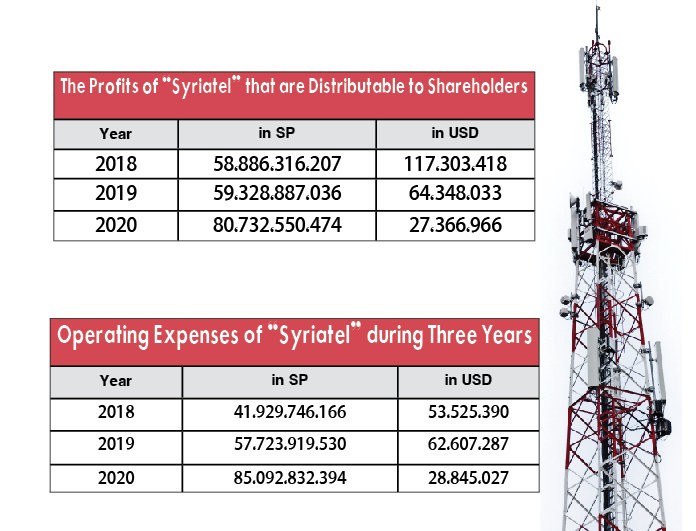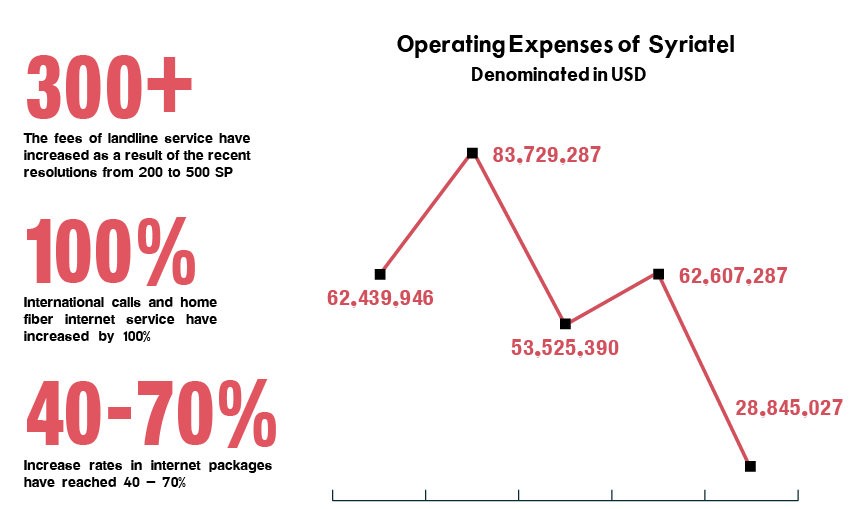- Articles
- Posted
Raising Telecommunication Fees; Have Operating Expenses Really Increased?
Over the past month, resolutions about raising internet, landline, and cellphone fees by the Syrian Telecom, “Syriatel” and “MTN” mobile network providers have taken place. As for landline and the internet, the increase included raising the prices of calls and corporate packages, as landline service fees has increased from 200 to 500 SP, while international calls and home fiber internet service have increased by 100%, whereas increase rates in internet packages have reached 40% to 70%. Also, the price of a cellphone minute for prepaid lines has increased from 13 to 18 SP, and for postpaid lines from 11 to 15 SP. In addition to increasing the prices of internet services for cellphone by varying rates and according to the service type.
According to data from “Syrian Telecom”, “Syriatel”, and “MTN”, the reason for raising prices is due to the increase in operating expenses, and the need for maintenance to improve quality of service. This raises the legitimate question: have operating expenses really increased? And is the increase in prices really due to the need to cover the presumed increase of expenses? or to the desire to maintain and increase an exceptional profit rate?
Allegations vs. Facts
According to “Syriatel”, the company whose announced data will be used as a model for the study in this article, it announced through a statement entitled “Let Us Continue to Serve You” that “given the economic situations and circumstances that our beloved country is going through, starting from the imposed war on Syria, in addition to the global economic embargo and the Caesar Act, etc., which led to inflation in exchange rate and difficulties in obtaining equipment, technical systems needed for maintenance, and the sustainability of the network, especially since Syriatel is obligated to pay the fees of service to global providers in foreign exchange. Also, the long and frequent power outages and the difficulty to secure diesel oil due to these long outages, as the increase in its price resulted in a significant increase in operating expenses, in addition to the necessity to rehabilitate power plants that were destroyed by terrorist acts”.
It is therefore clear that the company claims unequivocally that operating systems have witnessed a “significant increase”. So, since the main title of the statement of the company carried the expression “Let Us Continue to Serve You”, which leaves the impression in the observer that the company will not be able to continue to provide services if it did not raise its fees, it is important to study the previously declared financial disclosures by “Syriatel” itself.
What Do the Data tell Us?
During the last three years, the data of “Syriatel” recorded a decrease in the profits of the company in USD and an increase in Syrian pounds due to the currency’s depreciation. The average dollar price in the black market will be depended upon according to the year, as (according to the statement of the company itself) it is obligated to pay global servers in foreign exchange, as well as the fact that economic activities in the country are actually carried out on this basis.
As for the operating expenses, in contrast to the claims of its “significant increase”, the data of the company proves that these expenses have actually declined. In the financial data it declared during the years 2018, 2019, 2020, operating expenses were as follows:
We note from the figures that the expenses of the company denominated in USD have significantly declined between 2019, 2020, which opens the door to two questions: First, where is the significant increase in expenses that “Syriatel” talked about? and in case it existed why have they not declared it? Second, in case such increase existed, why would it be covered from the pockets of users? Isn’t it fair that the shareholders are the ones who should carry this burden? especially since the company (according to its data) has profits of millions of dollars!

Going Back to B.O.T
The contract signed between the Syrian government and the two telecommunications companies in 2011 (which is a type of contracts known as B.O.T) stipulates that the projects of cellular services (including the marketing and import operations that serve these projects) be established and committed to operate the two companies for 15 years starting from early 2001, and the government takes 30% of the total of revenues in the first three years, 40% in the next three years, and 50% in the remaining years until the end of the contract period, after which the property will be transferred to the benefit of the “General Communication Company”. However, in early 2015, the Syrian government made an unfair decision against Syrians, in which it turned B.O.T contracts into private ownership contracts, and reduced the government's share to 30% then to 20% in 2018.
That means, the ownership of the company that invokes a “significant increase” in expenses to increase the fees of its services is not supposed to be private until now (according to the B.O.T contracts). So, since operating expenses are actually declining as previously revealed in the figures, it is clear that the resolutions to raise prices do not aim to cover expenses but rather to maintain the profit rate of the owners of the company. This leads us to another question, is the profit rate of “Syriatel” in comparison with its declared revenues justified? or even close to be justified?

The Profit Rate of “Syriatel” is Exceptional!
During 2020, the pure profit of “Syriatel” from total revenues have reached 28.3%, which is an exceptional rate by all accounts if we compared it with some of the most advanced telecommunications companies in the region, such as STC in Saudi Arabia with a profit rate of 18.6%, “Türk Telekom” in Turkey with a rate of 11.2%, “Zain” in Kuwait with a rate of 10.2%, “Orange” in Jordan with a rate of 5.5%, and “Vodafone” (Egypt and Turkey) with a rate of 1%. These rates raise a large number of questions; does the large profit rate reflect the quality of the provided services by the company? and is there a need to raise the cost of telecommunications to cover operating expenses, or to increase the accumulation of wealth in the hands of owners? by taking into consideration the disparity in the purchasing power of the people of these countries, and the per capita share of expenditure on telecommunications.



